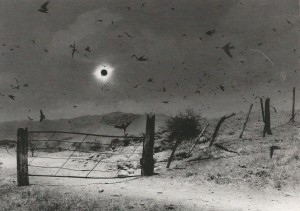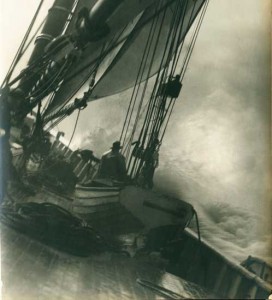
(photo: solar eclipse 1991 Antonio Turok)
The Accordion Effect
Immediate and as-it-occurs action should be written in short sentences. No subordinate clauses, very few adjectives or adverbs. Keep description of the scene strictly to what the reader needs to know. You should have setup the scene beforehand anyway. Your sentences should be brief. The verbs simple. The tense should be the simple past. I hate it when people try to write action in the present tense. It just doesn’t seem functional to me.
I will give some examples in a moment.
Use the old formula of the five senses; sight, sound, smell, touch and sometimes taste but that depends on what is going on. SHORT SENTENCES. Remember that when people are involved in some critical situation that one of the other of their senses often shut down. Very frightened people often stop hearing anything. They become deaf. I know this from personal observation.
If your hero is not frightened but indeed, on the attack, or a vigorous defense, or desperately trying to manage the tiller on a ship in a storm, their hearing won’t fault out on them but their other senses might. Remember that. I have read a sea story where a helmsman clinging to the tiller ‘tastes salt in his mouth’. That’s not likely. The tiller-clinger will likely have a very acute sense of hearing (listening to the tune of the riggings’ howling, listening for orders from the captain, a deep sense of the shift of the desk etc.) but his mind will likely throw the senses of taste and touch overboard as ‘not needed right now’. So choose which of the five senses is the most important at the time. Which one will add to the plot.

Again, keep your sentences short.
A person in a fight, that is to say, someone trained and willing to fight back, has an intense sense of vision. Quite often, if they are mad enough, they don’t feel blows or even pain very much until they are incapacitated. Then they feel it. On the contrary, frightened people shrinking back from an external threat will feel pain intensely and immediately.
Keep your sentences brief and forceful. I can’t say that enough.
Okay, back to the scene and its set-up and unrolling.
Your sentences can be longer and easier and more descriptive previous to the action. Then as danger approaches and becomes manifest, the sentences become shorter and shorter. Then as the danger passes or whatever happens happens, they become longer again. It’s the accordion effect.
Examples; Your hero is on a ship and a storm is approaching. Your sentences here can be long, with subordinate clauses, the description can be careful and even lush (the unrolling edge of the storm, the wind suddenly picking up anything on deck that is loose and skimming it about, concerned looks on the faces of the crew) and your hero more or less inactive, as he is observing it all.
But then it strikes and here your sentences should become short and shorter. I hope your hero does something. Rather than sweat and cry out O No we’re all going to die! A sheet snaps. The ship heels over. Our Hero throws himself up the rigging to grasp at the sails to bend them. He can’t get his hand around a line. A mate comes to help. He can’t see. The wind is driving packets of salt water into his eyes. Things he can’t identify strike him in the chest. (This was set up beforehand with the unnamed objects being blown about the deck). They struggle with the taut line etc. etc.
Never never never include memories or flashbacks in the middle of action. I have read some really stupid groaners. For instance a protagonist is faced with Grungar the Wild Man slavering for his blood and carrying a spiked club. And it was just that kind of spiked club with which the Dominion of Evil soldiers had broken into his house with when he was six years old! The memory comes back to him full force and he is nearly frozen!
So forget that.
One thing I want to re-state here is that beginning writers often actually think they have a proactive hero or central character when actually they have a passive character shrinking back in fear from external events. Lush descriptions of the characters state of terror does not count as action. ‘Her heart pounded, her mouth was dry, she could feel her palms drenched in sweat, her hair stood on end’ etc. I have read this so often I have wondered, ‘who is teaching this?’





